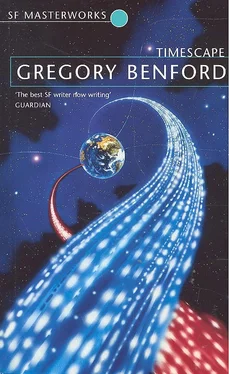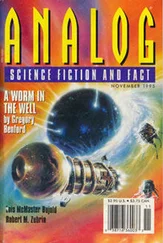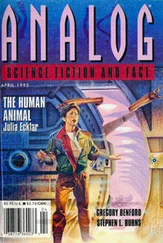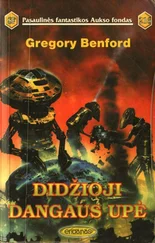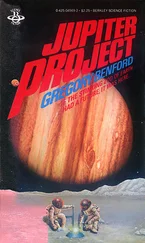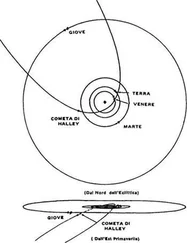Then Saul came on.
“From Yale University this evening, a startling announcement,” Cronkite began. “Professor Saul Shriffer, an astrophysicist, says that there is a possibility that recent experiments have detected a message from a civilization beyond our Earth.”
They switched to a shot of Saul pointing to a speck on a star chart. “The signals appear to come from the star 99 Hercules, similar to our own sun. 99 Hercules is 51 light years away. A light year is the distance—”
“They’re giving it so much time” Penny said wonderingly.
“Shhh!”
“—light travels in a year, at a speed of 186,000 miles per second.” A shot of Saul standing beside a small telescope. “The possible message was detected in a way astronomers had not anticipated—in an experiment by Professor Gordon Bernstein—”
“Oh, Jesus,” Gordon groaned.
“—at the University of California at La Jolla. The experiment involved a low-temperature measurement of how atoms line up in a magnetic field. The Bernstein experiments are still being studied—it is not certain that they are, in fact, picking up some signal from a distant civilization. But Professor Shriffer, a collaborator with Bernstein who broke the code in the signal, says he wants to alert the scientific community.” A picture of Saul writing equations at the blackboard. “There is a puzzling part of the message. A picture—”
A well-drawn version of the interweaving curves. Saul stood in front of it, speaking into a hand-held microphone. “Understand,” he said, “we make no specific claims at this time. But we would like the help of the scientific community in unraveling what this might mean.” Some brief talk about the decoding followed.
Back to Cronkite. “Several astronomers CBS News asked today for opinions expressed skepticism. If Professor Shriffer proves correct, though, it could mean very big news, indeed,” Cronkite made his reassuring smile. “And that’s the way it is, April the twelfth—”
Gordon clicked Cronkite off. “Goddamn,” he said, still stunned.
“I thought it was very well done,” Penny said judiciously.
“Well done? He wasn’t supposed to use my name at all!”
“Why, don’t you want any credit?”
“Credit? Christ—!” Gordon slammed a fist against the gray plaster wall with a resounding thump. “He did it all wrong, don’t you see that? I had this sinking feeling when he told me, and sure enough—there’s my name, tied to his crackpot theory!”
“But it’s your measurement—”
“I told him, keep my name out”
“Well, it was Walter Cronkite who gave your name. Not Saul.”
“Who cares who said it? I’m in it with Saul, now.”
“Why didn’t they have you on TV?” Penny asked innocently, clearly unable to see what all the fuss was about. “It was just a lot of pictures of Saul.”
Gordon grimaced. “That’s his strong suit. Simplify science down to a few sentences, screw it up any way you want, pander to the lowest common denominator—but be sure Saul Shriffer’s name is in lights. Big, gaudy, neon lights. Crap . Just—”
“He sort of hogged the credit, didn’t he?”
Gordon looked at her, puzzled. “Credit… ?” He stopped pacing the room. He saw that she honestly thought his anger was over not getting his face on TV. “Good grief.” He felt suddenly hot and flushed. He began unbuttoning his blue broadcloth shirt and thought about what to do. No point in talking to Penny—she was light years away from understanding how scientists felt about something like this.
He rolled up the sleeves of his shirt, puffing, and walking into the kitchen, where the telephone was.
• • •
Gordon began with, “Saul, I’m mad as hell.”
“Ah…” Gordon could picture Saul selecting just the right words. He was good at that, but it wasn’t going to do him any good this time. “Well, I know now you feel, Gordon, I really do, I saw the network show two hours ago and it was just as much a surprise to me as it was to you. The local Boston footage was clean, no mention of your name explicitly, the way you wanted it. I called them right away after I saw the Cronkite thing and they said it got all changed around up at the network level.”
“How did the network people know , Saul, if you didn’t—”
“Well, look, I had to tell the local people. For background info, y’know.”
“You said it wouldn’t get on.”
“I did what I could, Gordon. I was going to call you.”
“Why didn’t you? Why let me see it without—”
“I thought maybe you wouldn’t mind so much, after seeing how much time we got.” Saul’s voice changed tone. “It’s a big play , Gordon! People are going to sit up and take notice.”
Gordon said sourly, “Yeah, notice.”
“We’ll get some action on that picture. We’ll crack this thing.”
“It’ll crack us , more likely. Saul, I said I didn’t want to get dragged in. You said—”
“Don’t you see that was unrealistic?” Saul’s voice was calm and reasonable. “I humored you, sure, but it was bound to come out.”
“Not this way.”
“Believe me, this is how things work , Gordon. You weren’t getting anywhere before, were you? Admit it.”
He took a deep breath. “If anybody asks me, Saul, I’m going to say I don’t know where the signals are coming from. That’s the plain truth.”
“But that’s not the whole truth.”
“You are talking to me about the whole truth? You, Saul? You, who talked me into withholding the first message?”
“That was different. I wanted to clarify the issue—”
“The issue, shit! Listen, anybody asks me, I say I don’t agree with your interpretation.”
“You’ll release the first message?”
“I…” Gordon hesitated. “No, I don’t want to stir things up any more.” He wondered if Ramsey would continue to work on the experiments if he made the message public. Hell, for all he knew there really was some sort of national security element mixed up in this. Gordon knew he didn’t want any part of that. No, it was better to drop it.
“Gordon, I can understand your feelings.” The voice warmed. “All I ask is that you don’t hinder what I’m trying to do. I won’t get in your way, you don’t get in mine.”
“Well…” Gordon paused, his momentum blunted.
“And I truly am sorry about Cronkite and your name getting into it and all that. Okay?”
“I… okay,” Gordon muttered, not really knowing what he was agreeing with.
CHAPTER FIFTEEN

1998
GREGORY MARKHAM STOOD WITH HIS HANDS BEHIND his back, the gray of his temples giving him a remote, solemn air. The muted humming of the laboratory seemed to him a warming sound, a preoccupied buzzing of instruments which, if only in their unpredictable failures and idiosyncrasies, often resembled busy mortal workers. The laboratory was an island of sound in the hushed husk of the Cavendish, commanding all remaining resources. The Cav had ushered in the modern age, using the work of Faraday and Maxwell to create the tamed miracle of electricity. Now, Markham mused, at its center, a few men remained, trying to reach backward, swimmers against the stream.
Renfrew moved among the banks and lanes of instruments, darting from one trouble spot to another. Markham smiled at the man’s energy. In part it arose from the quiet presence of Ian Peterson, who lounged back in a chair and studied the oscilloscope face where the main signal was displayed. Renfrew fretted, aware that beneath Peterson’s veiled calm the man never lost his assessing eye.
Читать дальше
